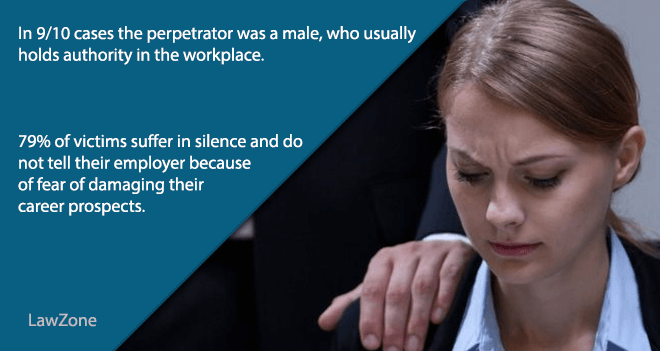Shock Study Reveals 50% of Women Suffer Workplace Sexual Harassment
A shock recent study researched jointly between the TUC (Trade Unions Congress) and the Everyday Sexism Project has discovered that 52% of women in the UK workplace have experienced an incident of sexual harassment. A third of the women polled for this study also experienced uninvited sexual comments, and a quarter of them spoke of an instance which involved an act of unwanted touching. The study also revealed that most women did not report the episode to a administrative body at their place of work.

The TUC is calling the report the biggest sexual harassment study for a generation. Laura Bates, the founder of the Everyday Sexism project, has expressed how serious the findings are:
This research shows there’s a huge gap between that perception and the reality of what women are facing. […] Many people would like to think that workplace sexual harassment was a thing of the past, in reality it is alive and well, and having a huge impact on tens of thousands of women’s lives.”
One of the causes of sexual harassment incidents going unreported to relevant authorities is that women are not confident they will be taken seriously. 24% of the women interviewed who have personally experienced this disclosing a lack of confidence as their reason. Furthermore, 15% of women spoke of feeling scared at the possibility that speaking out would have repercussions for their future career prospects, and 28% fear a disclosure might hurt their relationship with fellow colleagues. For 20% of women, the reason for staying silent is the embarrassment that a disclosure would cause.
The nature of sexual harassment goes far beyond an actual physical attack, which 1% of women said they experienced. An act of sexual harassment constitutes subtler behaviour that other members of staff may not detect, including comments of a sexual nature and inappropriate hugging, both directly or indirectly.
The TUC report has also brought to light reveals some of the employment scenarios through which sexual harassment is allowed to take place. It is especially prevalent in situations where women receive career benefits like flexible working and training opportunities, as this could lead to women being taken advantage of in exchange for such bonuses.
 The statistics of the survey also found that 17% of cases were perpetrated by the victim’s line manager or equivalent authority. Such behaviour is detailed as being possible due to hidden ‘power dynamics at play’ between bosses and employees.
The statistics of the survey also found that 17% of cases were perpetrated by the victim’s line manager or equivalent authority. Such behaviour is detailed as being possible due to hidden ‘power dynamics at play’ between bosses and employees.
The report also concluded that younger women aged between 18-24 are most likely to experience harassment. A total of 63% of the 130 women in this age bracket interviewed for the report claimed an experience of harassment.
Younger women are more likely to be on zero hour contracts, employed in junior roles, and working through temp agencies. The TUC believes these types of employment scenarios are factors that contribute towards harassing behaviour.
Frances O’Grady, the general secretary of the TUC, spoke to Radio 4’s The Today Show about her concern at the findings. She explained that many women decline to report harassment due to being ‘ashamed and frightened’ by the experience: “It makes us miserable at work where we just want to do our job and be respected.”
She also challenged the weak response that inappropriate comments are just ‘a bit of banter’ which female workers should not let affect them personally:
“How many times do we still hear that sexual harassment in the workplace is just a bit of ‘banter’? Let’s be clear – sexual harassment is undermining, humiliating and can have a huge effect on mental health … It has no place in a modern workplace, or in wider society.”
The results of the report have already influenced Labour Party MPs to back TUC agenda arguing for the reinstatement of parts of the Equality Act that would force employers to greater liability in harassment cases. Moreover, the TUC is also campaigning for the government to end the employment tribunal fees that employees must pay before a hearing can be granted, as it is believed the charges are discouraging women from seeking legal action. Some of these fees can be as high as £1,200.
The government has made a statement giving it’s own reaction to the report: “No one should experience harassment or abuse of any kind in the workplace [..] Section 40 has not been scrapped and any employee who experiences harassment is protected by the Equality Act – regardless of who the perpetrator is.”


